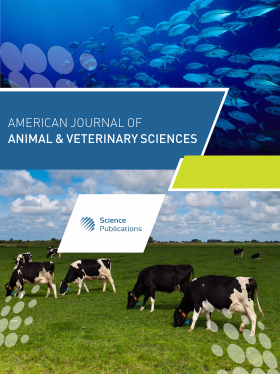Efficacy of Some Commercial Chemical Disinfectants on Salmonella enterica Serovar Typhimurium
- 1 Tuskegee University, United States
- 2 Suez Canal University, Egypt
Abstract
Problem statement: Poultry industry is intensive and consistently applies an all-in, all-out system with the aim of minimizing infection pressure and targeting specific pathogens like Salmonella which remains one of the leading causes of food-borne illness, many questions regarding the introduction and persistence in animal production still remain. Therefore disinfection during production break is a routine part of the biosecurity programs of poultry houses. The correct usage of disinfectants is an important key of a successful biosecurity program in poultry farms and in-turn the role of the scientist was to evaluate the efficacy of these disinfection programs. Approach: In this study five commercial disinfectants [Green work (green non anionic surfactant), Sanidate RTU (hydrogen peroxide compound), Hi-yeild®consan 20® (phenolic compound), Tektrol® (quaternary ammonium compound) and Kreso®D (phenolic compound)] were evaluated against Salmonella typhimurium in two different experimental conditions. In Experiment I, S. typhimurium was inoculated into fresh poultry litter (aluminum trays L: 30 cm × W: 25 cm × D: 6 cm filled with wood shavings) by inoculums size of ~107 CFU mL-1 and then mixed with 100 g of fresh poultry droppings. Sample sizes of 3 g were obtained daily for the bacterial counts. Green work achieved100% killing of S. typhimurium by day 7 (p≤0.0001); Sanidate RTU achieved100% killing by day 6 (p≤0.001); Hi-yield® Consan®, Tektrol® and Kreso® D achieved100% killing by day 5 (p≤0.001). Disinfectants were also compared to each other in their efficacy each day. At day 1, Green work was inferior to all other disinfectants at (p≤0.05). On day 2, Kreso® D was significantly superior to Tektrol®, Hi-yield® Consan®, Sanidate RTU and Green work at p≤0.01, p≤0.01, p≤0.01, p≤0.005; respectively. At day 4 Kreso® D was significantly superior to Hiyield ® Consan® at p≤0.01, Tektrol® was also significantly superior to Green work at p≤0.01. In experiment II; MIC use-dilution test was used to evaluate the five disinfectants against S. typhimurium (~107CFU mL-1) in the absence of organic matter. Results: Hourly samples were collected for the bacterial counts. Maximum efficacy (100% killing efficacy against S. typhimurium) was achieved for Green Work after 16 h (p≤0.0001), with Sanidate RTU after 8 h (p≤0.0001), with Hi-yield® Consan® and Kreso® D after 2 h at (p≤0.0001) and with Tektrol® after 4 h (p≤0.0001). In presence of organic matter Green work and Sanidate RTUachieved 100% killing efficacy against S. typhimurium after 16 h (p≤0.0001), Hi-yield® Consan® and Kreso® D after 2 h at (p≤0.0001); Tektrol® after 8 h (p≤0.0001). When disinfectants were compared to each other in relation to time; we found that there was no kind of significance between their efficacies. When compared to other tested disinfectants, Kreso® D which is a phenolic compound revealed superior activity against Salmonella typhimurium in the two experiments. Conclusion: The study showed that many disinfectants regardless to their constituents continues to give a very powerful efficacy against the most virulent bacterial strains, but the question remain can they be used in the presence of live birds. Further studies are required to explore the safety and the efficacy of these compounds when applied in poultry farms in the presence of live birds.
DOI: https://doi.org/10.3844/ajavsp.2009.58.64

- 5,857 Views
- 5,938 Downloads
- 6 Citations
Download
Keywords
- Disinfectants
- Salmonella typhimurium
- poultry
- organic matter
